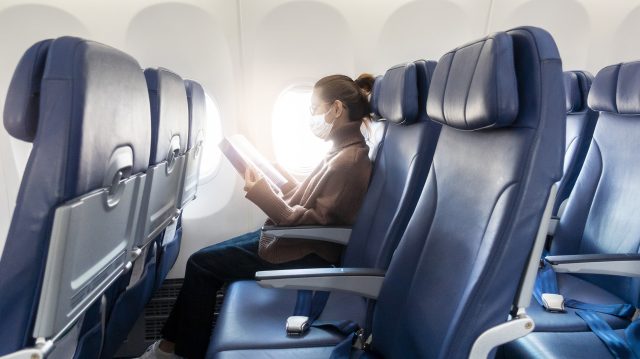
Travelers can take steps to reduce their risk of infection during the ongoing global COVID-19 pandemic. A University of Mississippi staff physician has offered several tips for doing so. Adobe Stock photo
OXFORD, Miss. – Whether traveling by airplane, train or bus, you can take steps to reduce your chances of contracting COVID-19 during the ongoing pandemic, a University of Mississippi physician advises.
“Once the decision has been made to travel for a holiday gathering, the next step is to plan the safest way to accomplish your travel,” said Hubert Spears, staff physician at UM Employee Health Service. “The least safe option would be a train, subway or a shuttle with multiple passengers.
“Statistically, a recent study cited there have only been 42 cases reported of contract COVID on airplanes, compared to 2,300 cases of COVID contracted on high-speed trains in China.”
Referring to a Journal of the American Medical Association article as his reference, Spears offered the following suggestions for safe air travel:
- Breathe air that flows directly at your head. Keep your seat’s air vent open and pointed directly at your head for maximal benefit because it is 50 percent outside air and 50 percent filtered by a HEPA filter. That air is not automatically directed at your head. You must adjust its direction and how open it is.
- Look for window seats. When you are in the aisle, you are exposed to the air of others. Window seats are safer than aisle seats because the outside air that flows down from overhead vents is relatively safe.
- Keep your mask on at all times. This means not eating or using the beverage service. Eat before you board. Eye protection is also recommended. Avoid touching your eyes, nose and mouth at all times.
- Check your luggage instead on carrying it on. Checked baggage will be sprayed with disinfectant before being loaded into the cargo area. It may be slower and cost a bit more, but the added layer of protection is worth it.
- Avoid conversation with strangers during the flight. Try to make sure no one sits in the middle seat.
- If possible, avoid using the lavatory while in flight. If you must go, wait until the restroom is vacant. Never wait in a line.
“Once you are off the plane, don’t let your guard down in the airport,” Spears said. “Keep your mask on even when alone in the bathroom stall.
“Use soap, water and a paper towel rather than a hand dryer, which may disperse microorganisms. Rent a car rather than use a taxi or ride share.”
Even with all those travel suggestions, Spears urged people to consider planning trips entirely by car if and when possible to minimize exposure to others.
“Only the people with whom you live should travel in the same car,” he said. “It would be best not to buy food at gas stations or eat in restaurants. If you must buy food, consider using a drive-thru.”
If you will be staying in a hotel, investigate the hotel’s COVID-19 policies and procedures before you book, Spears recommended.
“Don’t be afraid to inquire about their mask policy and their cleaning routines,” he said. “Avoid elevators, especially with strangers and certainly not crowded with strangers.”
Choose a hotel with room service so you don’t have to eat inside their restaurant or in another restaurant. This is more important for the winter months, when it is difficult to eat on an outside patio.
If a hotel stay is in your future, follow a few extra steps when considering room service.
“Request that the food from room service be left outside your door,” Spears said. “Offer to include the tip on your final bill or tell them you will leave the tip on the tray that you will put outside your door when you are finished. Always use totally electronic means of payment, when possible.”
